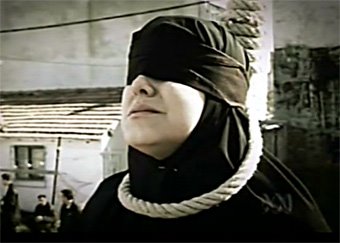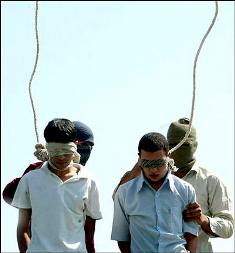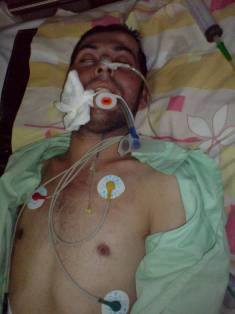(New York) - Iranian authorities in 2011 carried out more than 600 executions and imprisoned more journalists and bloggers than any other country, Human Rights Watch said today in issuing its World Report 2012 Iran chapter. Iran’s judiciary works hand-in-hand with security and intelligence forces to harass, imprison and convict opposition and rights activists, despite increasing international condemnation of the country’s rights record.
In March the United Nations Human Rights Council appointed Ahmed Shaheed to be the first special rapporteur on the situation of human rights in Iran since 2002. Since Shaheed’s appointment the Iranian government has refused him entry to the country, executed more than 400 prisoners – including people convicted of committing crimes when they were children, and prosecuted dozens of outspoken lawyers, journalists, and rights activists for their peaceful speech and associational activities. In February the authorities placed the 2009 presidential candidates Mir Hossein Mousavi and Mehdi Karroubi under house arrest, where they remain.
“The Iranian government crushes all voices of opposition while scoffing at the international community’s growing concern over human rights,” said Sarah Leah Whitson, Middle East director at Human Rights Watch.
In its 676-page World Report 2012, Human Rights Watch assesses progress on human rights during the past year in more than 90 countries, including popular uprisings in the Arab world that few would have imagined. Given the violent forces resisting the “Arab Spring,” the international community has an important role to play in assisting the birth of rights-respecting democracies in the region, Human Rights Watch said in the report.
In Iran, the authorities carried out more than 600 executions, according to several rights groups, even though the Office of the High Commissioner for Human Rights and four UN experts pressed Iranian officials for an immediate moratorium on the death penalty, “particularly for drug-related and juvenile cases.” Government sources announced only around 350 of these executions. The vast majority were for drug-related offenses, including trafficking and possession. The pace of executions accelerated following the entry into force in December 2010 of an amended anti-narcotics law, drafted by the Expediency Council and approved by Supreme Leader Ayatollah Ali Khamenei.
Despite the hundreds of executions, Yuri Fedotov, executive director of the UN Office on Drugs and Crime (UNODC), made no mention of the wave of executions taking place in Iran for drug-related offenses and praised the country’s anti-drug efforts during a visit to Tehran in July. The UNODC has provided up to $22 million since 2005 to support training projects for Iran’s anti-drug forces, and the European commission, European Union member states, and several other governments including Japan, Norway, Australia and Canada, provide money, technical assistance, and legislative support to Iran’s anti-drug efforts.
Iran also led the world in the reported execution of people convicted of offenses they allegedly committed before age 18, despite the prohibition on such executions under international law. Iranian law allows capital punishment for people who have reached puberty, defined as age 9 for girls and 15 for boys. The judiciary allowed the execution of at least three children in 2011.
Authorities have executed at least 30 people since January 2010 on the charge of moharebeh (“enmity against God”), for alleged ties to armed or terrorist groups. On January 9, 2012, a revolutionary court in Tehran sentenced Amir Mirzaei Hekmati, an Iranian-American, to death on charges of moharebeh, “corruption on earth,” and espionage. The judiciary sentenced Hekmati after authorities detained him for more than four months without providing him access to a lawyer, his family, or the Swiss consular officials who represent American interests in Iran.
As of December 42 journalists and bloggers were in prison in Iran, according to the Committee to Protect Journalists. More than 60 journalists were forced into exile in 2011 alone, and authorities have shut down at least 40 publications since 2009. On January 17, 2012, Iran’s Supreme Court confirmed the death sentence for blogger Saeed Malekpour, a Canadian resident who was convicted of “insulting and desecrating Islam” in October 2011. At least two other individuals have been sentenced to death by the judiciary on internet-related charges. The government blocks certain websites that carry political news and analysis, slows down internet speeds to hinder web access, and jams foreign satellite broadcasts.
In January 2011 a revolutionary court sentenced Nasrin Sotoudeh, a prominent rights lawyer, to 11 years in prison and barred her from practicing law and leaving the country for 20 years on charges of “acting against the national security” and “propaganda against the regime.” The judiciary later reduced her sentence to six years and a 10-year ban on travel and practicing law. The judiciary prosecuted, convicted, or sentenced several other prominent lawyers to prison terms and bans on the practice of law. Earlier in the year Sadegh Larijani, the Head of the Judiciary, warned lawyers that they should refrain from giving interviews that damage the government’s reputation.
On January 10, 2012, the Interior Ministry’s election commission disqualified several dozen candidates from running in the upcoming March 2 parliamentary elections because of their “lack of adherence to Islam and the Constitution.” The disqualified candidates include several incumbents who were critical of President Mahmoud Ahmadinejad’s government. In November and December reformist and opposition activists, some of whom are currently serving prison terms, issued several statements calling the parliamentary elections a sham and concluding there was no reason to field candidates. In December the Iranian judiciary announced that anyone calling for a boycott of the upcoming parliamentary elections would be subject to prosecution.
Mousavi and Karroubi were placed under house arrest in February 2011 after they called for mass protests. Several days earlier, beginning on February 8, security forces had arbitrarily arrested dozens of political opposition members in Tehran and several other cities.
“The continued detention of Mousavi and Karroubi, not to mention the dozens of reformist candidates arrested after the disputed 2009 presidential election, is a reminder to all of us that Iran’s human rights crisis is linked to the demand of citizens to participate in free and fair elections,” Whitson said.
































































